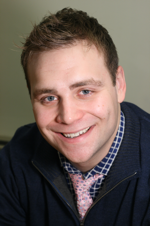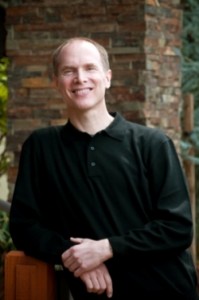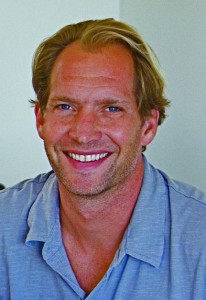Evangelism
The Whole Gospel
Ken Wytsma's Pursuing Justice: The Call to Live & Die for Bigger Things is a passionate evangelical argument for making justice central to a gospel-rooted life. For those who already embrace social justice in their faith, it is a spiritual refresher and resource for engaging with more wary Christians. Thomas Nelson
Their Future, Our Future
Girl Rising, a feature film on the power of education in the lives of nine girls from the developing world, releases March 7. It is at the center of a social action campaign for girls' education called 10x10, launched by former ABC News journalists. Learn more, advocate, or organize a screening. 10x10act.org
THE NAME OF Oswald Chambers is well known to millions of Christians for a collection of notes gathered by his wife from his sermons and published as a devotional reader in 1927, 10 years after his death, under the title My Utmost for His Highest.
Like many Christians, I first read this devotional guide while still in college and harbored the suspicion that this man must have been a somber if not puritanical pillar of the faith. The gaunt, almost cadaverous portrait of him included in many editions of his most famous work contributed much to these impressions of mine. It turns out, though, that I did not know the human being who was Oswald Chambers.
I recently stumbled upon a crumbling book in the library stacks of a local university that greatly altered my perceptions of him. It was an out-of-print collection of tributes by those who knew him best, along with his personal diaries from his travels abroad as an itinerant preacher and as a YMCA chaplain in World War I until his sudden death from complications following an emergency appendectomy at the age of 43. As I read through these documents, I found myself strongly attracted to Chambers as a person and captivated by his vision of what it means to be a believer in the modern world.
AS A STUDENT of art at the University of Edinburgh, Chambers was not known among his peers for his religious devotion, which he had received from devout Scottish Baptist parents. He was better known, rather, for his outgoing personality and his knowledge and love of poetry, art, and music. He was gifted not only with a keen aesthetic sensitivity and outgoing temperament, but also with a rigorous mind. After completing his studies he became a tutor at Dunoon College in Scotland in 1898, where he taught logic, moral philosophy, and psychology for several years.
ONCE UPON A TIME, long before there were birth certificates or Social Security numbers, there were immigrants. If you are or have been an immigrant without documents, you may think life must have been easier then, that you would never be afraid of getting found out and deported.
But life was not easier—at least not in the first century C.E., in the five mostly rural Roman provinces in what is now Turkey. Especially if you were a follower of Jesus.
As an immigrant, you are called by one of two names in Greek, the trade language of the time. You are a paroikos if you had fled or been forced from your native community for any personal, economic, or political reason and were trying to eke out a living in a foreign land. Oikos refers to "house" or the economic structure of the extended household in which native people lived. Para means "alongside of." In other words, you are "away from home," a resident alien on the edges of ordinary life.
Consequently, you have fewer rights than full citizens. Never able to own land, you are a sharecropper, a craftsperson, or perhaps a small trader or shopkeeper. You may have been driven off your land by high taxes you could not pay, or perhaps you are a second son and will not inherit your father's land. You may be the wife or daughter of such a man, or a widow driven to support yourself and your children. You have legal restrictions regarding intermarriage, commerce, and succession of property. You have no political rights, such as voting in public assemblies or joining in guilds. Unlike citizens, if you are charged with a crime, you can be tortured.

Facebook is breaking my heart.
As I survey the reactions of my fellow evangelicals to the Newtown tragedy, I have seen three strains of thought, each of which absolve us of any responsibility: (1) It would have been different if the principal or a teacher was armed; (2) If Americans care about the slaughter of innocent children, why don't they care more about abortion?; and (3) The secularization of school and society plays a role in these shootings. A few stray comments about mental illness have also floated around vaguely.
Absent from all of this analysis is any consideration of our own failure to do exactly what evangelicals should be all about: Evangelism, in the form of reaching out and giving meaning to lost souls like the loner kid who became the 20-year-old who committed these murders. If a relationship with God is what gives a young life a connection to community, a sense of humility and service, and a devotion to what is good, that is exactly what Adam Lanza needed.

According to a report late Friday from Christian Solidarity Worldwide, an international organization devoted to issues of religious freedom, Pastor Youcef Nadarkhani, a Muslim convert to Christianity who has been imprisoned by the Iranian government since 2009 on apostasy charges, has been acquitted and released from prison.
Nadarkhani, 35, previously had faced a possible death sentence for the charges against him, a result of his prostelytizing Muslims to convert to Christianity. He also refused to deny his Christian faith to save himself from execution.
Since his detainment three years ago, the U.S. State Department, the British government, the Vatican, Amnesty International, and a host of Christian organizations and leaders — including South Africa's Archbishop Desmond Tutu — have called on the Iranian government to release the young pastor.
ON A FLIGHT from New York City to Guatemala some years back, I met a woman from Oklahoma on her way to visit her soon-to-be internationally adopted daughter. “I just found them, the Guatemalan children, on the internet and thought they were so beautiful,” she said. She beamed, her blue eyes, carefully painted lips, and cross earrings all sparkling.
Guatemala’s landscape, where wistful clouds cruise above fertile fields and past rumbling volcanoes, reflects the volatility of the country’s tragic history. That history includes a decades-long civil war, ending in 1996, in which more than 200,000 people were killed, mainly by U.S.-backed government forces. To visit the country is to experience not just that history, but also a culture that pioneered astronomy, devised an intricate written language, and erected engineering miracles. But, asked whether she intended to preserve her adoptive daughter’s ties to her homeland, the woman I met on the plane said, “If she wants to see it, we’ll bring her. But really, there’s nothing there.”
The attitude that “there’s nothing there” is, all too frequently, the attitude of missionaries en route to Guatemala. But when Joel Van Dyke arrived in 2003 from Philadelphia, he suspected there was plenty there—there in the country’s slums and in the cities’ bursting garbage dumps, where thousands of people find sustenance every day. He set out to find what was there by learning to ask the right questions of gang members, slum dwellers, sex workers, and the local faith leaders who work with them. To do this, he told Sojourners, he had to adopt the attitude “let’s go see what God is doing in the world and let that color and shape the theological discourse.”

The long-smoldering debate at the U.S. Air Force Academy over the role of religion in cadets' lives has reignited, just as a new class arrives on campus for basic training.
Accusations of improper proselytizing on the Colorado Springs, Colo., campus have been challenged by those who argue that AFA guidelines curtail religious expression.
The two sides recently clashed over a letter from 66 House Republicans urging Defense Secretary Leon Panetta to investigate the USAF’s growing “hostility toward religious freedom” under guidelines set last September by USAF Chief of Staff Gen. Norton Schwartz.
In response to allegations of proselytizing, Schwarz mandated that only chaplains could endorse religious programs.
Youcef Nadarkhani, the 35-year-old Christian pastor has been imprisoned in Iran since October 2009 after protesting a law that all children read the Quaran and being charged with evangelizing to Muslims. The trial date has been set for Sept. 8.
From the Christian Post:
"According to Present Truth Ministries, which has been closely monitoring the pastor's case, Nadarkhani will presumably be tried for crimes against security. 'We assume by implication that this means the charges of apostasy have been dropped since the new charges have been issued, but we have no confirmation of that,' the ministry said Thursday."

We Christians have a remarkable talent for sticking our feet in our mouths. When searching the words most commonly associated with “Christian,” the list ain’t pretty. I think part of this can be attributed to a handful of phrases that, if stricken from our vocabulary, might make us a little more tolerable. Yes, these things may mean something to you, but trust me, non-Christians don’t share your love for these tried-and-true cliches.
So in no particular order, here are ten phrases Christians should lose with a quickness.
To believe is easy. You can fill stadiums with people wanting to believe, either to solidify what they already think or to grasp hold of something because they feel cast adrift and lost at sea.
To doubt, to interrogate your fear, to really question what you believe, that’s difficult. It’s difficult because we want to protect ourselves from doubt and unknowing. Indeed when we encounter somebody who is different from us, our first experience is often to see them as monstrous, as having beliefs and practices which are alien and stranger and historical and contingent. When we encounter them we either want to consume them, make them part of our social body, or we want to vomit them and get rid of them. Or perhaps we want to have some sort of interfaith dialogue where we can talk about where we agree.

I first heard the term "evangelical" in the 1980s, about the time the Swaggarts and Bakkers were imploding. Christianity needed a new name for sane, intellectually sound faith.
"Born-again" had been sullied by the televangelists and worn out by Debbie Boone’s explanation of how she justified singing the lyrics to “You Light Up My Life.”
"Jesus Freak" had died with the Peace movement.
We needed another word to separate true Christians from fake ones; sheep from goats; serious believers from those who merely checked the “Christian” box on their driver’s license application because Jew, Muslim or Ekkankar didn’t apply.
(Sometimes I wonder if all the denominations in Christendom are merely a list of the nomenclature we’ve used to separate Us from Them.)

Justice Groups Start Work On 'Common Good' Platform For 2012 Election; The 5 Biggest Failures Of The 112th Congress; An AIDS-Free Generation; At Occupy LA Eviction, Police Restrict Media CoverageThousands Of Immigrant Kids Ask Obama To Stop Deportations; Evangelism And Environmentalism: A Time To Act (OPINION); When Rehab Is Cut -- You Hurt Too.

Is Halloween a prime time for evangelism?
Are religious tracks passed out along with (or in lieu of) "treats" really the best way to spread the gospel message?
Or do the roots and practices of Halloween run so deeply counter to Christian tradition that Halloween is best ignored by believers?
At times such as these, the church often finds itself wrestling with the big question H. Richard Niebuhr posed in his seminal 1951 work, Christ and Culture. That is, to what extent should Christians engage in and interact with the world around them?
If justice is only an implication, it can easily become optional and, especially in privileged churches, non-existent. In the New Testament, conversion happens in two movements: Repentance and following. Belief and obedience. Salvation and justice. Faith and discipleship.
Atonement-only theology and its churches are in most serious jeopardy of missing the vision of justice at the heart of the kingdom of God. The atonement-only gospel is simply too small, too narrow, too bifurcated, and ultimately too private.
The reason the word Evangelical has become so poisonous is because the answer to the above question comes from a conversion-based model of cultural engagement - political, theological and social. Too many Christians believe, and have wrongly been taught, that those "others" and "opposites" who have made an active choice not to believe in "our" teachings are justifiably: 1) left to their own devices as we wash our hands of them because of their bad choice (think in terms of blood-on-their-own-head); or 2) uninformed, so much so that their "no" is an illegitimate answer.
Evangelicals care more about positions -- whether progressive or conservative -- than people. We lack nuance. We have become either all Scripture or all Justice. I don't know where the balance was lost in terms of holding Scripture in high authority and, simultaneously, loving with reckless abandon?
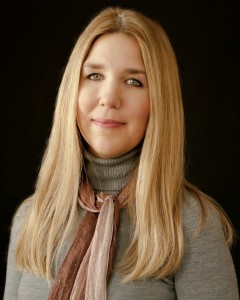
Evangelicals had always seemed like the "other" Christians. They were the ones who didn't celebrate Advent or baptize babies. They were the ones who went colleges that required pledges not to drink, smoke or dance. They were the ones who frowned upon evolution or "free-thinking."
As a child of the 1970s and '80s, I saw evangelicals as politically and socially conservative -- ever skeptical of culture and worried about what we were reading and watching. They bobbed for apples at "Harvest" parties instead of trick-or-treating on Halloween. They were the ones telling Kevin Bacon he couldn't be footloose and fancy free -- or maybe those were "fundamentalists." Did it matter? Was there even a difference?
Do Evangelicals hate smart people?
No. But it is such a persistent rumor that it might take something as momentous as another Protestant Reformation to see it die.
Why?
Because there are folks out there that do hate smart people. More precisely, there are people of faith who draw a line between "God's Word" and "Man's Opinion." They set up human reason as a force fighting against God's truth. While I think most Christians would agree that human reason is imperfect and limited (as humanists and scientists would probably agree as well) that doesn't make it antithetical to "God's Word." Most Christian traditions acknowledge reason as a gift from God not an enemy of God.
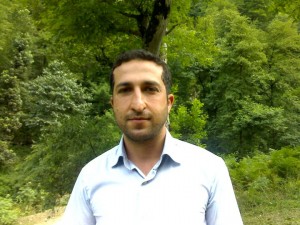 The news cycle often moves so quickly that very often big news stories are forgotten within a day, sometimes even more quickly.
The news cycle often moves so quickly that very often big news stories are forgotten within a day, sometimes even more quickly.
I prayerfully hope that this is not and will not be the case with the story of Pastor Youcef Nadarkhani, the Iranian Christian leader who has been sentenced to death for refusing to recant his religious beliefs and convert to Islam.
Arrested in 2009 on a charge of apostasy, he has spent two years in jail, with his wife also being jailed on similar charges last year.
As the evangelical community in Portland rediscovered the calling of showing, in addition to sharing their faith, everything has changed. And it's only the beginning of what God is doing in our city. We're in it for the long-haul.
Not only have many great needs been met, but churches are working together in relationship as never before. The impact of one church humbly serving is profound. But the impact of a united Church serving in concert, actually has the power to change how the world views the Gospel.
